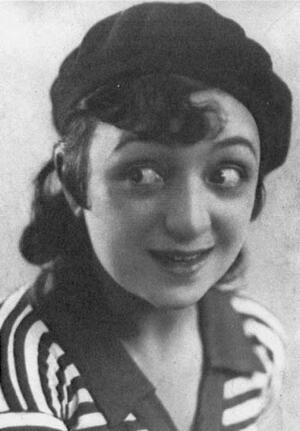Award for Yiddish actress, Molly Picon
For more than eighty years Molly Picon charmed the public and helped keep the Yiddish theater alive. Best known for her potrayals of "the adorable waif" (often a boy) in Yiddish plays, she also acted, sang and danced her way through English plays, and appeared on film, television and on Broadway.
Institution: American Jewish Historical Society
Born in New York in 1898, Molly Picon moved with her family to Philadelphia before she was three. It was in Philadelphia that she performed in public for the first time, in 1903, at age five. Picon's mother, who worked as a seamstress for a Yiddish theatre, entered her daughter in a talent contest. On the way to the contest, a drunk on the streetcar challenged the child to perform then and there. She did, and then collected two dollars in coins from the passengers. She went on to win the contest, and a legendary theatre career was born.
Picon acted in local productions throughout her youth, and left high school at 16 to tour as Topsy in a Yiddish production of Uncle Tom's Cabin. She soon joined a traveling vaudeville troupe, where she was cast as Winter in a production called The Four Seasons. When the troupe reached Boston in 1918, they found the city shut down due to an epidemic of influenza. Only one theatre, the Boston Grand Opera House, was functioning. Picon applied for work there, and was hired. The next year, she married the theatre's director and producer, Jacob Kalich. In 1920, the pair toured Europe, performing Yiddish theatre to great popular success. By the time they returned to New York, Picon's was a well-known name on both sides of the Atlantic.
Many of Picon's roles were in plays created for her by Kalich. Perhaps the most famous of these was Yonkele, a young Peter-Pan-like boy who wants to make the world a better place. It was a role she would play over and over into her 80s. Like Yonkele, many of Picon's most successful characters were either young boys or young girls who acted like boys. During the 1920s, she performed these roles across the U.S. and also made her film debut. Among her films was the 1923 Viennese production of Ost und West (East and West), which is now the earliest surviving Yiddish film. In 1934, she began broadcasting her first radio show, increasing the size of the audience that was already enthralled with the petite, dark-haired woman with the mischievous eyes.
Throughout the 1930s, Picon and Kalich traveled back and forth between Europe and the U.S. to perform. In 1938, they made the last Jewish film to be created in Poland before the Nazi invasion. Mamale, in which the 40-year-old Picon played a 12-year-old girl, was a musical comedy, but it also sought to document the endangered shtetl culture. During the Second World War, Picon performed for soldiers in USO camps. After the war, she brought music and theatre to displaced persons camps and then to Israel. She also performed in the first Yiddish play (Oy Is Dus a Leben! (What a Hard Life!), 1942) ever to reach Broadway, a biographical piece based on Picon's own early years.
Over the four decades after the war, Picon continued to perform in both Yiddish and English, including as an Italian mother in Come Blow Your Horn (1963), for which she won an Oscar nomination; as Yente in the movie version of Fiddler on the Roof (1971); and with Barbra Streisand in For Pete's Sake (1974). At the age of 81, Picon created a new one-woman show, Hello, Molly (1979), which traced her long relationship with the Yiddish theatre. In 1980, she published her autobiography, titled simply Molly!. On June 28, 1980, she received a Creative Achievement Award from the Performing Arts Unit of B'nai B'rith; the following year, she was elected to the Broadway Hall of Fame. In 1985, the Congress of Jewish Culture awarded her a "Goldie" for lifetime achievement. Picon died of Alzheimer's on April 6, 1992. Her plays and films are frequently revived for a younger generation, keeping alive her legacy of contributions to Yiddish culture.
Sources: Jewish Women in America: An Historical Encyclopedia, pp. 1064-1068; New York Times, March 30, 1979, March 3, 1981, April 7, 1992; www.MakingTrouble.com.



